A rare Israeli strike in central Beirut killed the Hezbollah militant group’s chief spokesman on Sunday, while an Israeli strike in northern Gaza’s Beit Lahiya killed at least 30 people, a hospital director said.
Mohammed Afif al-Naboulsi was killed in a strike on the Arab socialist Baath party’s office in Beirut, Hezbollah confirmed in a statement.

Mr Afif had been especially visible after all-out war erupted between Israel and Hezbollah in September.
It was the latest targeted killing of senior Hezbollah officials. On Sunday night, another strike in central Beirut hit a computer shop, killing two people and wounding 22, Lebanon’s Health Ministry said.
There was no immediate comment from Israel’s military for either strike.
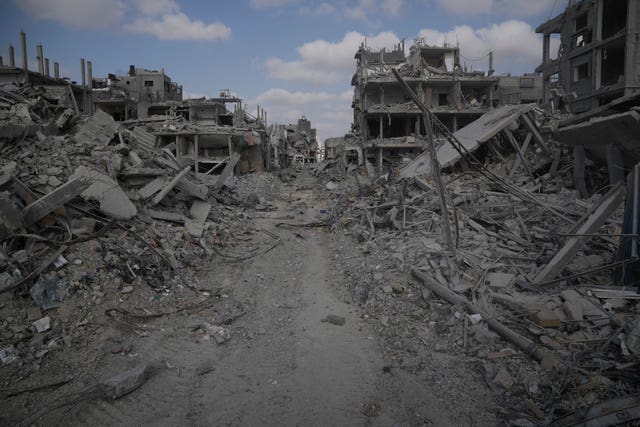
The strikes happened as Lebanese officials considered a United States-led ceasefire proposal. “This confirms the crimes of the Israeli enemy, and that it wants to negotiate under fire and is expanding and targeting safe and safer areas,” said a Lebanese member of parliament, Faisal Al Sayegh.
Israel also bombed several buildings in Beirut’s southern suburbs, where Hezbollah has long been headquartered, after warning people to evacuate.
Earlier, Israeli strikes killed at least 12 people in the Gaza Strip, officials said, where Israel has been at war with Hamas for more than a year.
The last Israeli strike in central Beirut was on October 10, when 22 people were killed in strikes on two locations.

Hezbollah began firing rockets, missiles and drones into Israel the day after Hamas’s attack on October 7 2023, which ignited the war in Gaza.
Israel launched retaliatory air strikes in Lebanon and the conflict steadily escalated, erupting into all-out war in September. Israeli forces invaded Lebanon on October 1.
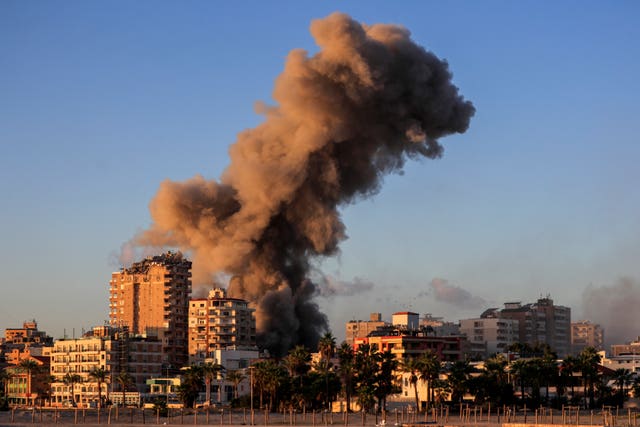
Hezbollah has continued to fire dozens of projectiles into Israel each day and has expanded its range to the central part of the country. The attacks have killed at least 76 people, including 31 soldiers, and caused some 60,000 people to flee in the north.
A rocket barrage on the northern city of Haifa on Saturday damaged a synagogue and wounded two civilians.
More than 3,400 people have been killed in Lebanon, according to the country’s health ministry, and more than 1.2 million driven from their homes. It is not known how many of the dead are Hezbollah fighters.
Lebanon’s army, largely on the sidelines, said an Israeli strike on Sunday hit a military centre in south-eastern Al-Mari, killing two soldiers and wounding two others. There was no immediate Israeli comment.
Israeli strikes killed six people in Nuseirat and another four in Bureij, two built-up refugee camps in central Gaza.
Another two people were killed in a strike on Gaza’s main north-south highway, according to the Al-Aqsa Martyrs Hospital in the central city of Deir al-Balah, which received all 12 bodies.
The war between Israel and Hamas began after Palestinian militants stormed into Israel in 2023, killing about 1,200 people – mostly civilians – and abducting 250 others. Around 100 hostages are still inside Gaza, about a third of them believed to be dead.
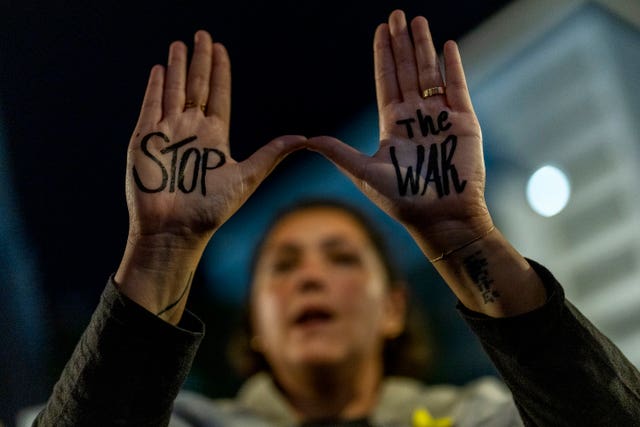
The health ministry in Gaza says around 43,800 Palestinians have been killed in the war. The ministry does not distinguish between civilians and combatants but has said women and children make up more than half the fatalities.
Around 90% of Gaza’s population of 2.3 million Palestinians have been displaced, and large areas of the territory have been flattened by Israeli bombardment and ground operations.
Israeli police meanwhile arrested three suspects after flares were fired at Prime Minister Benjamin Netanyahu’s private residence in the coastal city of Caesarea.
Mr Netanyahu and his family were not at the residence when two flares were fired at it overnight, and there were no injuries, authorities said. A drone launched by Hezbollah struck the residence last month, also when Mr Netanyahu and his family were away.
The police did not provide details about the suspects behind the flares, but officials pointed to domestic political critics of Mr Netanyahu.
Israel’s largely ceremonial president, Isaac Herzog, condemned the incident and warned against “an escalation of the violence in the public sphere”.
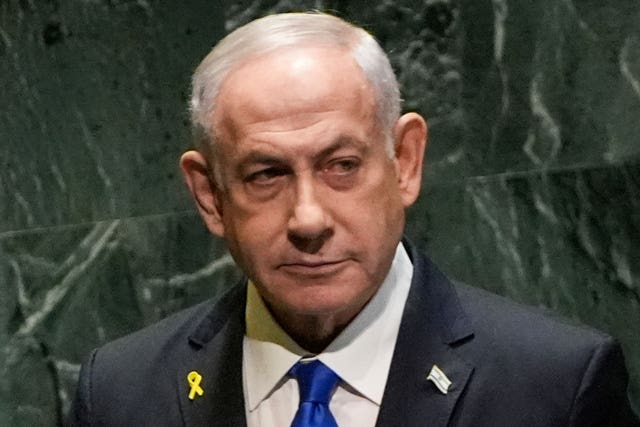
Mr Netanyahu has faced months of mass protests over his handling of the hostage crisis unleashed by Hamas’s attack on Israel in 2023.
Critics blame Mr Netanyahu for the security and intelligence failures that allowed the attack to happen and for not reaching a deal with Hamas to release scores of hostages still held inside Gaza.
Israelis rallied again in the city of Tel Aviv on Saturday night to demand a ceasefire deal to return them.
Israeli justice minister Yariv Levin seized on the flare attack on Mr Netanyahu’s home to call for a revival of his plans to overhaul the Israeli judiciary, which had sparked months of mass protests before the war.
“The time has come to provide full support for the restoration of the justice system and the law enforcement systems, and to put an end to anarchy, rampage, refusal, and attempts to harm the prime minister,” he said in a statement.
Supporters said the judiciary changes aim to strengthen democracy by circumscribing the authority of unelected judges and turning over more powers to elected officials. Opponents see the overhaul as a power grab by Mr Netanyahu.
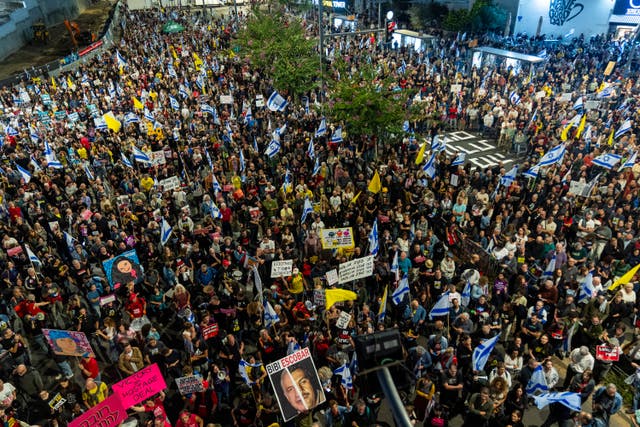
Many Israelis believe the fierce internal divisions caused by the attempted overhaul had weakened the country and its military ahead of the Hamas assault.
Opposition leader Yair Lapid said in a post on X that he “strongly condemns” the firing of flares at Mr Netanyahu’s home while criticising Mr Levin’s proposal.
“Levin should go home with rest of this irresponsible government,” Mr Lapid wrote. “We will not let him turn Israel into an undemocratic state.”




Why are you making commenting on The Herald only available to subscribers?
It should have been a safe space for informed debate, somewhere for readers to discuss issues around the biggest stories of the day, but all too often the below the line comments on most websites have become bogged down by off-topic discussions and abuse.
heraldscotland.com is tackling this problem by allowing only subscribers to comment.
We are doing this to improve the experience for our loyal readers and we believe it will reduce the ability of trolls and troublemakers, who occasionally find their way onto our site, to abuse our journalists and readers. We also hope it will help the comments section fulfil its promise as a part of Scotland's conversation with itself.
We are lucky at The Herald. We are read by an informed, educated readership who can add their knowledge and insights to our stories.
That is invaluable.
We are making the subscriber-only change to support our valued readers, who tell us they don't want the site cluttered up with irrelevant comments, untruths and abuse.
In the past, the journalist’s job was to collect and distribute information to the audience. Technology means that readers can shape a discussion. We look forward to hearing from you on heraldscotland.com
Comments & Moderation
Readers’ comments: You are personally liable for the content of any comments you upload to this website, so please act responsibly. We do not pre-moderate or monitor readers’ comments appearing on our websites, but we do post-moderate in response to complaints we receive or otherwise when a potential problem comes to our attention. You can make a complaint by using the ‘report this post’ link . We may then apply our discretion under the user terms to amend or delete comments.
Post moderation is undertaken full-time 9am-6pm on weekdays, and on a part-time basis outwith those hours.
Read the rules hereLast Updated:
Report this comment Cancel